In every corner of society, there are women who wear countless hats with grace, determination, and unparalleled strength. These women, often referred to as “women of many titles,” are the bedrock of their communities, the champions of change, and the embodiment of resilience. They navigate the delicate balance of career, family, leadership, and advocacy, leaving an indelible mark on the world.
While celebrating the virtuous women, it is vital to acknowledge and celebrate the contributions of these women. They remind us that strength is multifaceted, leadership is inclusive, and the future is limitless. To all the women who are CEOs, caregivers, activists, mentors, creators, and everything in between: your efforts shape the world in ways that are immeasurable. You are the proof that no title or role is beyond reach, and the world is better because of you.
Professor Anita M. Diop was born and raised in Detroit, MI. She is a wife, mother of 2, grandmother of 6 and mentor to 1000’s. She is currently teaching African American and American History at Hopkinsville Community College and serves as the Adviser for the Minority Student Union and the History Club. She is also the Founder and Executive Director for the African Roots and Heritage Foundation (ARHF).
Professor Diop specializes in the promotion of Arts and Culture, her scholarly works, include, Katherine Dunham: An African American Cultural Icon and various essays and articles. She is also is a travel photographer and has exhibited her photographic essay, entitled Eyes of the African Princess, at Charles H. Wright Museum of African American History and many other government sites, colleges, and universities.
To her credit, Professor Diop is also an award-winning short film Director, Producer of Concrete Roses, taking 2nd place in the Detroit Film Festival. In 2010, Anita was elected as the Ohio Representative for the Sixth Regional Diaspora Caucus and later became the International Representative to the African Union. She has sat on the 3rd and 4th Pan African Cultural Congress, and the 3rd Minister of Culture (CAMC3) and the Youth, Culture, and Sport (STC-YCS2).
In 2018 she was elected as an Officer of the First African Union Pan African Writers Conference. She is a delegate to the AACC (African Audio Visual & Cinema Commission) participated in writing a Treaty, which was ratified by all member states in 2019. Another accolade awarded to her in July 2021, Professor Diop became the Ambassador for the Sixth Region to the African Union (ACALAN) African Academy of Languages. In December 2021 she was nominated for a five-year term to serve as the Ambassador to African Languages Week Coordinating Committee. The list of her achievements and accomplishments are endless.
In an exclusive interview with ADEWALE ADENRELE of Dotolive News Magazine, Professor Anita M. Diop speaks about her experience, challenges, lifestyle, research works, the vision and mission of ARFH and her elevatation as Mafo (Queen) of the Baleng
Below are excerpts:
- Your profile is captivating, motivating and inspiring; can you tell us briefly about your family ancestral link/lineage, your growing up and educational background?
I was born and raised in the city of Detroit, MI USA to auto workers (Detroit is the Motor capital of the world) I attended Class Technical High School with a diploma in the Performing Arts. My graduate degrees were taken at Wayne State University in the areas of African and African American History with an emphasis in Culture and the Arts. Through DNA Testing, I was able to trace my roots back to the Bassa people of Cameroon.
- Researches put forward a new narrative explaining the variations in African ancestry in the Americas and how these variations were shaped by the transatlantic trade, how has you and many others changing the narrative for development?
The slave traders constantly feared rebellion of the enslaved Africans. Therefore they were meticulous to mix the slaves from different ports in Africa once they were in the Americas to keep people of like languages from communicating with each other. Additionally, they ran breeding farms where they selected string males and took them around the plantations for the purposes of breeding. By the second generation Africans were no longer knowledgeable of their parents’ language, origins. Families were split up and mass confusion, coupled with survival in a cruel system stymied the African from forming bonds.
Regarding development, 1st the Diaspora must feel apart by reuniting with those on the continent. Secondly, those on the continent must also ready themselves to accept the wrongs of the past, heal and repair the breach. Once both side are ready to work as one whole, we can go forth sharing our collective skills by putting out minds together and create the New African Thought. This philosophy is necessary to create the path forward and usher in the African Renaissance. The new birth that our common ancestors wants for all of her children.
The entire continent and the Sixth region must do a Sankofa, which to go back and pick up the gems of the past. Theses gems are our traditions and culture and the power to propel us forward to create the Africa We Want.
- As a Professor teaching African American and American History, tell us the difference between them, the challenges you faced while studying and how did you overcome them?
African American History is American History. The problem occurs when the contribution by African Americans is omitted from this History. Even today in 2024 Governors and other in powerful position is making it illegal to teach African History or Studies. It was just in the early 1970’s that many college students protested and held sit ins to have African American Studies recognized as pertinent classes and should be taught in colleges, universities, and secondary school. It is people like me that understand the importance and detriment to the entire society in which we live, if African Americans contributions are obliterated from the classroom.
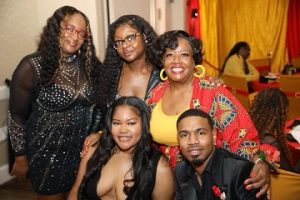
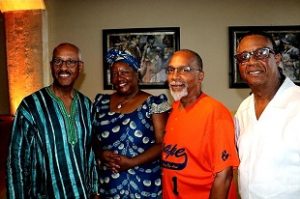
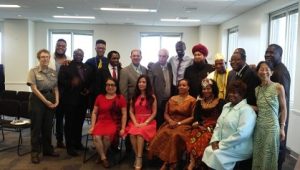
- You are the Founder and Executive Director for the African Roots and Heritage Foundation (ARHF), what are the vision and mission of this organization?
Our vision is to aid the Africana Renaissance. That is to prepare all Africans and their Descendants to be empowered when the world receives the paradigm shift. Therefore our mission is to uplift, motivate, and inspire the youth worldwide. We do so by providing technology in the form of computers, wi-fi routers, scholarships, and much more too disadvantaged youth.
- One of your works, include, Katherine Dunham: An African American Cultural Icon tell us briefly about it and some photographic essay?
Katherine Dunham: An African American Cultural Icon, is my first publication and it details the triumph of retaining African Cultural traits in the Americas through the Art of Dance. I travelled to three different continents gathering research Katherine Dunham. She is known as the mother of American Modern Dance. The signature dance movement is call the pelvic girdle and is used in every form on dance including ballet.
The photographic Essay entitled, “Eyes of the African Princesss” was inspired by my late grandmother. As I was preparing to take my first journey of visiting 5 different countries in Africa, my grandmother stated, that she would never go, but wanted to see Africa Through my eyes. During my visit to Senegal, Ghana, South Africa, Togo and Benin I was able to capture the beauty of the people, land, culture and traditions of the people. The exhibit was launched at the Charles H. Wright Museum of African American History (largest museum of its kind at that time). Since that time, the exhibit has travelled around the USA in government buildings, colleges and universities.
- With your leadership role and vast experience as an Officer of the First African Union Pan African Writers Conference, Ohio Representative for the Sixth Regional Diaspora Caucus, International Representative to the African Union, the 3rd Minister of Culture, What are the needs in Africa, What will it take to build entrepreneurship and employment in Africa, And what are you trying to do to move the needle?
If I access Africa, I see one fundamental need and that is self-love. Sometime after the European invasion, slave trade and colonization Africans no longer see themselves as first class citizens of the world. My message is to re-erect the original thought, and ways of the ancestors to bring us back to a place of pride. As long as we think we are lower and other races are higher because of their insistent raping and pillaging of our resources, bad propaganda, destroying our culture and replacing it with their religion, we cannot go forward as a collective proud people. Once we shake off the yoke, we will demand the respect and negotiate our way forward on behalf of our selves. Think about so many negotiations table that left the people out in the cold. For instance, Sierra Leone, sold their coastline to others, and now what was free now incurs an expense. Sierra Leone could have done the same thing the other did for the benefit of the country. Now look at them, crying because those people who used to earn a living a fisherman, now are forbidden to fish and poverty has overtaken them. This is a clear example of: lack of proper negotiation skills fueled by the lack of self-love. If we love ourselves rightfully, every decision we make will be on our behalf. In this instance, there was no guide in the negotiations. The negotiation favored those who acquired the coastline and not the citizens of Sierra Leone. As I work with the youth, I instill in them something that Kunta Kinte told his child, “Behold No One Greater than Yourself”. I live by this mantra and share it with all who receive it. a highly developed Self-esteem is need to push ourselves into excellence.
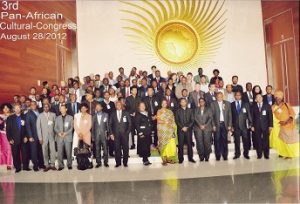
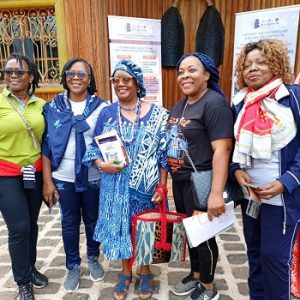
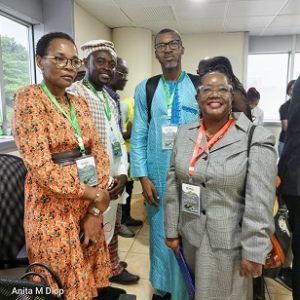
- You were elevated to Mafo (Queen) of the Baleng People in Cameroon and also Nkunkuma (Woman King) of the Soa people in Cameroon, how have you impacted this position on the African people especially children, women and youths?
Since assuming these roles both Kingdoms have initiated Language Seminars to learn their native languages. The Kingdom of Baleng has already made it mandatory in their secondary schools and host events around language annually, in line with African Languages Week which is February 21-28 with the African Union.
- A lot of African nations are fashioning their democracy after the west, yet we exist in some level of neo-colonialism. Well, is there a way to localize democracy that will fit the African context?
Yes there is….simply return to the ways of the Ancestors. Understanding we have nothing to lose, because the WEST has taken everything. So, we can start fresh with our own, if we dare to! Our example is China. When China got it independence, they banned everything unto and including religion and picked up their ancestral traditions and now they soar as a strong global force.
- You performed the reverse of the Triangular Slave Trade by producing the first Black History Month celebration in Cameroon, reuniting the Diaspora to their brother and sisters of Cameroon. How would you use your experience to motivate other Americans who are of African descent to join you?
I have established the DRP -Diaspora Reconnection Program that is designed to reconnect the Diaspora to their roots. We travel two times a year of will specialize an excursion for anyone who wants to know more about their roots.
- Will you consider the establishment of African Roots and Heritage Foundation (ARHF), as a tool to reduce unemployment in Africans or do you have another plan?
Fundamentally we are a culture and heritage preservation organization. We do provide jobs, but operate mainly from the volunteers of the youth. We train them giving them skills that are in demand in other employment arenas. I truly believe the way to reduce unemployment is to shift the mindset to “being your own boss” and employ others. Africa is a ripe playground for Foreigners, they see what Africans can’t see and they use the resources at their feet and know how the world needs its products, goods, or services to earn a living in a foreign land. Foreigners do no come to Africa looking for a job, but rather how they can fill a gap, provide a service, or product that is needed in the community. Yet when African travel abroad, they look for jobs, not entrepreneurship. So if we shift our thinking, we can fill the service gap in our own communities. I might add it is a false belief that foreigners come with money. They have credit and will pay back over time from the monies they make in your community. I say this because too many Africans want to start out as millionaires and fail to see it is the small humble beginnings, utilizing the resources within your grasp that will propel you into success.
- You have visited many countries, what would you advise the African leaders?
My advice to African Leaders is to instill national pride in their own airports, landmarks and making their countries attractive for tourists, which helps the economy. Limit the foreign ownership of land, minerals and harvesting natural resources. Don’t allow anything to be harvested for free. I will give an example. The country of Angola is very rich in frogs, but they do not eat them or have any value to the natives. However, it is the Chinese who use frogs for food. Here is the problem, the Chinese are allowed to harvest the frogs at no cost and only pay a small fee to ship to China. When this is clearly a job that the Angolans can do and sell to the Chinese, thereby creating an at home economy. If African leaders took on the mindset of Africa first, then their citizens can explore all the possibilities with the resources that is within their countries.
- Dotolive News Magazine would like to be reporting and promoting your activities; would you consider partnering with us and what will be your commitment to DNM?
We are open to partnerships, as we have a shared vision I am sure that we can agree on the way forward that will enhance ARHF as well as Dotolive New Magazine
- African ethnic groups and tribes have customs and traditions that are unique to their culture. What do you like about African Culture?
As I discover African Culture, I discover parts of me that were hidden or not properly explained. It is like seeing myself for the first time. Loving myself in all authentic ways.
- Amazing memories are unforgettable; can you share with us most amazing memory?
The most amazing memory is other worldly. In my youth, I used to dream about mountains and really did not think much about it, until 2017. I had taken an apartment in Simbock. Each morning it seemed as if the mountain would say look at me. I began to take pictures of the mountain and asked the local people wa there any history about the mountain. It is called EloDim. The folklore has it that people go to meet GOD on that mountain. Well, I am a spiritual person. One day, I was looking at all the pictures of the mountain and it dawned on me that these were the mountains I dreamed of as a child. To my further Surprise, I was visiting with the King of Bogso/Ezeka and the elders of the villiage. I relayed these very details to them and they decoded my dreams. Stating that, “The ancestors had led me back to my people in Simbock. He went on to say that Simbock is a combination of two words (Si) which means land of and (Mbock) which is a family name. Simbock is the land of the Bassa people and because of conflict they were forced into slavery and moved their current headquarters to the Bogso/Ezeka area. During this meeting the emotions were running very high. Tears were falling from men and women alike as they recognized me as a Daughter of the Bassa people. They acknowledged my dream as a sign that the ancestors lead me back to reclaim my people. The Elder went on to say that, no matter where the banana ripens whether in the water or on the earth, when it is ready is shall appear. I accepted it.
- What advice would you give the younger ones?
My advice to the youth is to strive for excellence, to believe in yourself, surround yourself with people with purpose and ambition.
Thanks for sharing with us!
Thank you too.




